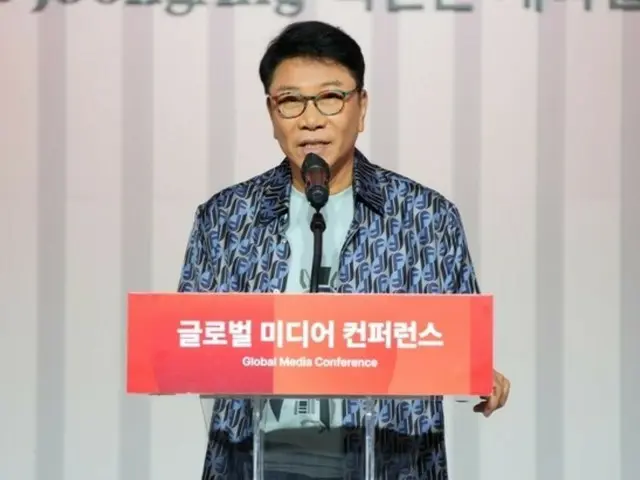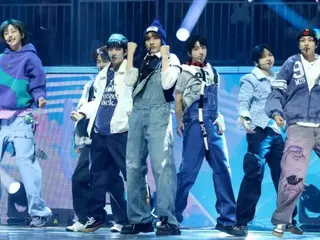Lee Soo-man, founder of SM Entertainment and star producer of A2O Entertainment, recently opened the Global
In his keynote speech at the 2018 International Media Conference, he said, "In 1981, while studying in the United States, he first realized the importance of producers, witnessed the birth of MTV, and became a music producer."
Lee Soo-man, the pioneer of K-POP, experienced the shift from "music to music to watch" and founded "SM Planning" after returning to Japan in 1989. He started out with "HOT", then "TVXQ",
SUPER JUNIOR", "Girls' Generation", "SHINee", "f(x)", "EXO", "Red
It has produced many of Korea's most representative K-POP idols, including "Velvet" and "NCT."
K-POP, the Korean pop music genre that started out inspired by American pop music, has now become a global mainstream and is moving forward as a "country of producers."
A person in the music industry, A, told Herald Pop, "It's difficult to clearly categorize music into genres, but when the name 'K-POP' is attached, it becomes more high-quality."
"According to Spotify's figures, K-POP only accounts for less than 10% of the market. However, in the past, overseas producers and music video directors
Unlike when they were asking directors to collaborate, now they want to collaborate (with K-pop) first."
16 years after SM's "Song Camp" was introduced... How has K-POP changed?
At the MU:CON 2025 event hosted by the Korea Creative Content Agency on the 10th, Ghazi Shami of the famous American independent label EMPIRE
Shami) praised the music coming out of Korea, saying, "The word 'amazing' is not enough." Recently, "K-Pop Girls!
He described "Demon Hunters" as "the pinnacle of K-Pop" and compared BIGBANG's G-DRAGON to America's Justin Timberlake.
A person involved said, "When I went to MU:CON, I definitely noticed that the needs (of overseas composers) had changed. Just five or seven years ago, it was difficult to hold a song camp.
"In the past, foreign composers were invited to perform at concerts, but nowadays, many of these events are held online," he said, describing the changing scene. Such evaluations both in Korea and abroad show that K-pop is no longer a simple genre.
This means that it has expanded from a cultural phenomenon to a platform for producing talent and ensuring national competitiveness.
It was "BIGBANG", "BTS", and "BLACK
PINK" are Korea's representative idol stars, but it was the system that made them possible. In the past, they purchased songs from overseas composers or made them to order, and
If they invited composers to Seoul to produce, SM would have started the "Songki" project in 2009, where various composers would gather, exchange opinions, work together, and produce songs.
The company was the first to introduce the "song camp" and quickly put K-POP on the competitive track. "Song camp" is a regular event held by major entertainment agencies such as HYBE, JYP, and YG.
It has become a system for composing music, and every time it is held, composers from all over the world gather. What is the reason they come to Korea?
Another music industry insider, Mr. B, told Herald Pop, "Just the Spotify figures alone are
"It's difficult to determine the scale of K-POP," he said, "K-POP is a comprehensive culture that is created by connecting a single song to music videos, performances, and fandom activities."
Global fandom creates a market that is much larger than the simple streaming numbers. This structure allows overseas composers to have stable copyright income.
Ultimately, K-POP has attracted many foreign composers to provide a creative platform and commercial appeal that goes beyond chart success.
"K-POP-ness"... What is the reason why overseas listeners are so enthusiastic? "K-POP Girls!
The OST "Golden" for "Demon Hunters" was the first main track on the US Billboard charts in July.
It reached number one on the singles chart "Hot 100" and has remained at the top for six weeks. Social media platforms such as Instagram, TikTok, and YouTube are popular with foreigners of all ages and genders.
Regardless of their background, they are dancing to the OST of "KPOP Girls! Demon Hunters" and taking on the challenge. If so, following the example of overseas composers, people around the world will be able to dance to the OST of "KPOP Girls! Demon Hunters".
What is the reason for the fervor surrounding "K! Demon Hunters"? Stray Kids members CHANG BIN and IN appeared in the TVING documentary "K! Demon Hunters"
In his book "K-POP GENERATION," he defined K-POP as "a comprehensive art form that combines music, dance, and fashion." He believes that K-POP should be understood as a cultural phenomenon that transcends a simple music genre.
The definition of "K-POP" that they talk about is exactly the same as the reason why fans are so enthusiastic about it. The key is the bridge that provides a gap between the addictive chorus.
The music, their speedy beats, their sharp dance moves that send shivers down your spine, and their gorgeous visuals and costumes are typical elements that are reminiscent of K-POP. "KPOP Girls!
The OSTs for "Demon Hunters," such as "Golden," "Your Idol," and "Soda Pop," match exactly. This is the key to "K-Pop-ness."
Because of this, while listeners who are used to the "K-POP" style have praised it, some have commented that it is "not special" or "music that sounds familiar."
As mentioned above, K-POP has not yet been able to capture a large share of the market on Spotify, so it feels fresh to overseas listeners, and this syndrome
A person in the music industry said, "The global success of 'K-Pop Girls! Demon Hunters' has led to more global song camps and collaborations.
"The future of K-POP with the introduction of foreign composers and the remaining issues The future of K-POP is bright with limitless possibilities for development.
Mr. B said, "K-pop has now gone beyond simply exporting artists and music, and is developing into a platform that exports both talent and systems.
If there has been a trend of learning in the international market, in the future, various experts such as composers, producers, publishers, A&R, marketing, and branding who have grown up in Korea will be able to learn from the global market.
"We are entering an era where people will be scouted in the global market," he said. This means that the "era of producers" that producer Lee Soo-man mentioned earlier is developing.
While the globalization of K-POP has achieved great results, there are also conflicting views. Some say that foreign composers are actively involved in the creation of K-POP, while at the same time, Korean composers are
There are concerns that there may be less room for composers. In response, a source said, "As K-POP becomes more international, collaborations with overseas composers are on the rise.
"The process of creating new opportunities for Korean composers, rather than taking away their place," he explained. "Foreign composers bring global trends and diverse musical ideas,
Korean composers have a deep understanding and experience of K-POP, and they are able to localize it and improve its quality. In particular, Korean composers have a sensitive sense of cultural context and a deep understanding of the K-POP system.
"The know-how we have accumulated over the years is a strength that simply cannot be replaced," he said, adding, "In the end, what's important is that creators with different backgrounds come together and create new synergies."
Global collaborations are an essential driving force for K-pop to expand into a wider market. The combination of fresh ideas from overseas and the relative insights of Korean composers is a key factor.
When combined, K-pop can produce more original and accomplished results.
2025/10/11 13:08 KST
Copyrights(C) Herald wowkorea.jp 95






![Stream on your TV:
[#stills Heart Club/Full Version] 3R Ensemble Room Full Cam](/img/Breaking/100/501348/592968_tmb.webp)

![Stream on your TV:
[#stills Heart Club/Full Version] Immediately ♬ Man Spirit](/img/Breaking/99/499726/591364_tmb.webp)
![Stream on your TV:
[#stills Heart Club/4th] 3R Dual Stage Battle "Soon" | Man](/img/Breaking/99/499711/591350_tmb.webp)

